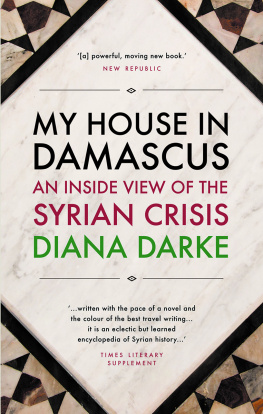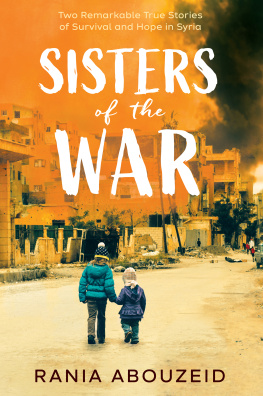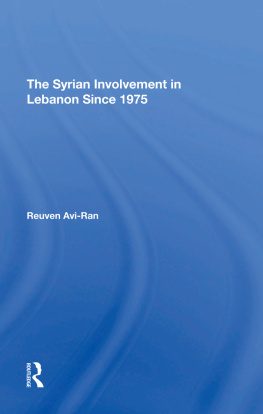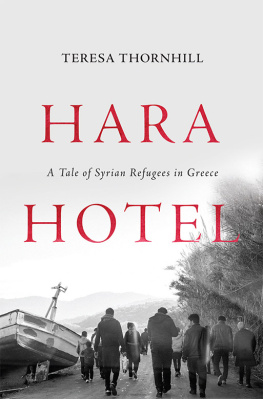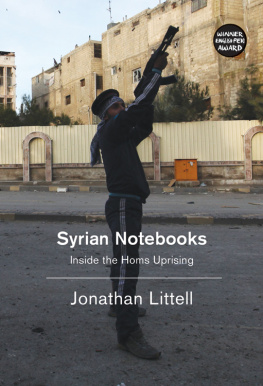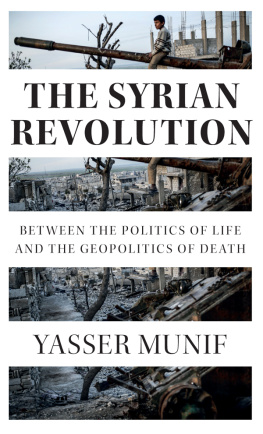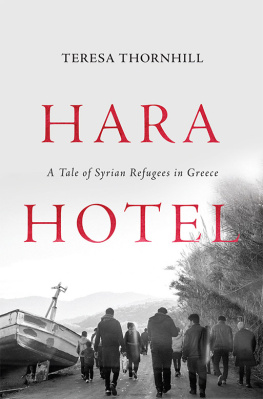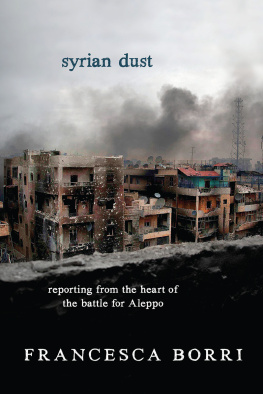When translating Arabic names into English, there are several options for how to form the name. In this book, I have opted for translations that are consistent with each other in style, to allow a smooth reading experience. Similarly, with place names in Syria, there are multiple correct English spellings. Daraya, for example, can also be spelled Darayya. I have chosen to spell these places in accordance with how the people of Daraya spell them: these places are their homes, I will take their lead.
On a separate note, I refer to the terrorist organisation known to the world variously as IS, ISIS, ISIL, Daesh, and many other names besides, initially as the so-called Islamic State and IS thereafter.
Some peoples names have been changed in order to protect the individuals and their families from possible arrest or ill treatment by Syrias security services.
As dawn breaks, the crack of rifle fire echoes through empty streets. Yellow mist, a sulphury haze of exploded barrel bombs and burning plastic, hangs over shattered homes, their warped, crumbling roofs splayed forward. Here and there charred electric cables dangle down, limp lines of debris over a prone, bleeding city.
Picking his way through the lifeless landscape, defying the rotten smells and prolonged, rumbling explosions, a teenage boy slips through the half-buried entrance of a gutted building. After shutting the outside door, its weathered surface pockmarked with cracks and holes, the boy descends. Down, down he goes, step by careful step, into the darkness. One palm touches the wall steadying his passage, the other hand grips his precious bundle of books. As he nears the foot of the concrete stairs, the sounds of war fade into silence, broken only by the echoes of his sandalled feet.
In the gloom, the boy gropes for a light switch. With electricity now a rarity, he does so more in hope than expectation. A naked bulb flickers into life, illuminating a large basement room with generous high ceilings.
Books, long rows of them, line almost every wall. Grand volumes with brown leather covers; tattered old tomes with barely readable spines; pocket-sized guides to poetry; classic and contemporary novels; religious works with gaudy gold-lettering; a range of reference books: all rub shoulders in well-ordered literary lines, their neat, regimented rows marred only by occasional kinks in the handmade shelves.
Setting his books on a table, fourteen-year-old Amjad bustles about, preparing for the day ahead, stopping here and there to align the chairs and rehome the odd stray book. It is early and this is his time. The only sounds, the shifting of books, the rustling of paper and the faint hum of a small rusty generator. A cloth in hand, Amjad makes for a narrow bookcase. Carefully, he takes the volumes down, then lovingly dusts each and every one, before buffing the shelves to a hazy shine.
In a few hours time the secret library will open for business. Between twenty to thirty people arrive every day. All make treacherous journeys across the shattered city, braving snipers, bombs and missiles. Their rewarda few precious moments quietly choosing books, reading and exchanging news. Then they return to the streets and warily, block by block, inch their way home.
The books Amjad so lovingly tends were not bought from shops or delivered by publishers. Most were bravely gathered from burning homes and bombed council offices, often under shelling and sniper fire. Filling this library was a dangerous business.
Amjad meticulously signs every book in and out, each one handled like a priceless treasure. Names, addresses and return dates are logged. He smiles and nods, while advising on the merits of one book or another. Not that he ever has bad words to say about any of them. As choices are made and titles bundled into bags, everyone is told to keep safe and come back soon. Though whether Amjad is thinking as much of his beloved books as the person borrowing them, is hard to say.
There is only one thing more important to Amjad than the thousands of books on the shelves and that is the secrecy of the library itself. Everyone is told to reveal its location only to those they trust. Otherwise, he warns, pro-Assad planes will destroy it. That, the teenage tells me, in a near-starving city that is slowly dying each day, would be the end of hope for us all.
As a Foreign Correspondent for the BBC, I am no stranger to war zones. From Somalia, Iraq and Afghanistan to Sri Lanka, Myanmar and Colombia I have seen the horrors of what man can do to man, and of course women and children too. Every war has its share of horrors and depravity, but one conflict in particular sticks in my mind. I will never forget the extraordinary brutality to women during ongoing unrest in the eastern Democratic Republic of Congo. Many were not only raped by militia groups and sometime government soldiers, but also violated with rifle barrels and other implements, in many cases in front of their children. I remember asking a doctor who was treating survivors of sexual violence in the town of Bukavu in 2007 why he thought people did this. After all, these were men with mothers and often wives, sisters and daughters of their own. He told me that he had come to believe in a chilling explanation voiced by a former militia member he had treated. The man had told him: If you can destroy a womans ability to bear children, while also destroying her mind, you melt the glue that binds your enemys community together. You kill his will to fight. I have never been able to forget those awful words.
In 2011, when President Bashar al-Assads security forces opened fire and killed several pro-democracy protesters in the southern city of Daraa, I watched events on an ancient, spluttering television, in northern Congo. I was covering the murderous march of what was left of the notorious Lords Resistance Army, or LRA, through large isolated swathes of central Africa. I had been in Damascus only a few months before and remembered the tensions and rebellious spirit of many I had talked to there. Much of this was expressed to me in furtive whispers in cafs and hotel lobbies, or in scribbled notes on scraps of paper. But these had not in any way prepared me for what was to follow. Damascus, with its attractive tree-lined streets and pretty flower-adorned restaurants, did not look a likely war zone capital. Yet the deaths in Daraya would soon ignite an uprising against President Bashar al-Assad and his regime, which would spread across the country. Nearly eight years of war and untold suffering that continues to this day.



